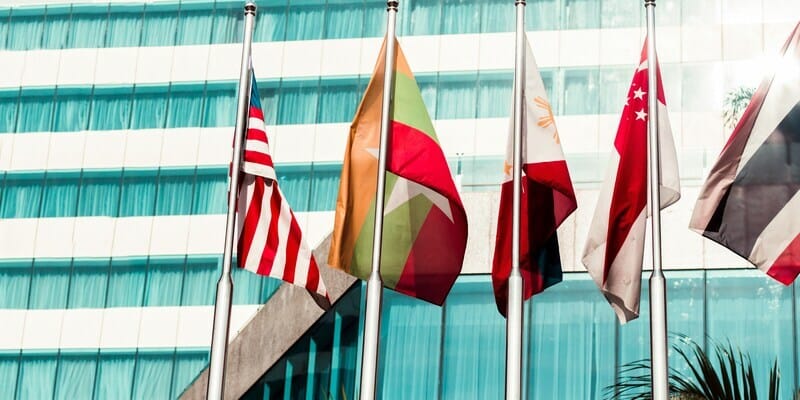4 Oct
Namaste! Aaj ka news roundup, Newswala style!
 | Today, Your Newswala Delivers:
|
And also check out Bengaluru's jaw-dropping LinkedIn office which might beat Google as well!
Chalo chalein!
Today’s reading time is 5 minutes.
MARKETS
| 25,250.10 | 2.12% | |
| 82,497.10 | 2.10% | |
| 51,845.20 | 2.04% | |
| 23,881.55 | 2.43% | |
| ₹50,93,494 | 0.04% |
Markets: Markets took a sharp hit, falling over 2% as worries about rising tensions in the Middle East pushed crude oil prices higher. Sectors like real estate, auto, and energy were hit the hardest, while the volatility index spiked, showing that investors are feeling anxious about the situation.
TOP STORIES
Newcomers shake up India’s budget phone segment

What happened?
Smaller mobile brands like Nothing, Motorola and Poco are stepping up to challenge the likes of Samsung, Xiaomi and Oppo in India’s highly competitive budget smartphone market. This segment, covering phones priced between ₹10,000-20,000, represents 47% of total industry shipments.
While Samsung saw its volumes drop 24% in the September quarter, Motorola and Poco grew by 49% and 29%, respectively.
Nothing saw a staggering 567% growth in the first half of 2024, selling around 100,000 units.
With new designs and aggressive pricing, these brands are going head-to-head with the established players.
Why it matters
The budget segment is crucial because it drives almost half of all smartphone shipments in India. Smaller brands, like Motorola, boosted their market share from 3% to 5%, while Xiaomi’s Poco saw a big win by expanding offline, now making up 30% of its sales, up from just 5% last year.
Meanwhile, Samsung's share dropped from 17% to 14%, showing that competition in this price range is fierce. Consumers are gravitating toward affordable 5G devices with top-notch features like enhanced performance, eye-catching designs and custom finishes.
Zoom out
As bigger brands like Samsung and Xiaomi focus on premium devices, the budget market is seeing a resurgence, rebounding from a pandemic low of 40% to 47% of the overall market in H1 2024. With festive seasons approaching and a stronger demand for 5G, these smaller players are ready to grow even further.
PAISON KA KHEL
India’s tea gets a ₹664-crore boost to brew better!

The Tea Board has launched a new initiative to uplift the Indian tea industry with a substantial budget of ₹664 crore, set to run from 2023-24 to 2025-26. This scheme, featuring seven major components, aims to enhance every aspect of the tea journey—from plantation to cup.
Key highlights include support for replanting tea bushes in gardens over 10 hectares, technological upgrades for quality enhancement and global promotion of Indian tea brands to boost domestic consumption through strategic marketing campaigns.
OpenAI secures $6.6 billion funding and races ahead
OpenAI just scored a jaw-dropping $6.6 billion in funding, with heavyweights like Microsoft, Nvidia and returning venture capital champions Thrive Capital and Khosla Ventures joining the mix. This hefty cash injection boosts OpenAI's valuation to a staggering $157 billion!
While OpenAI projects a revenue of $3.6 billion this year, it's also grappling with a $5 billion loss. Investors are betting big on future growth and who can blame them? With 250 million weekly users engaging with ChatGPT, it seems like OpenAI is on a fast track to the stars!
TOP STORIES
BPCL and Mumbai Port Authority lead India into the green fuel era

What happened
Bharat Petroleum Corporation Limited (BPCL) has teamed up with the Mumbai Port Authority (MPA) to kickstart India’s first green fuel ecosystem. This groundbreaking initiative aims to develop infrastructure for producing and distributing green fuels, primarily focusing on biofuels and hydrogen. The partnership is set to transform the maritime sector by reducing carbon emissions and promoting sustainable practices in the industry.
Why it matters
This initiative comes at a crucial time as India ramps up its efforts to achieve carbon neutrality by 2070. By prioritizing biofuels and hydrogen, BPCL and MPA are paving the way for cleaner, greener alternatives in a sector notorious for high emissions.
The project could potentially reduce greenhouse gas emissions from ships by up to 70%, making it a significant step towards a more sustainable future. Additionally, this collaboration could spur innovation and investment in renewable energy technologies, creating new jobs in the sector.
Final Words
The launch of India’s first green fuel ecosystem by BPCL and Mumbai Port Authority marks a significant milestone in the country’s energy landscape. As we navigate the choppy waters of climate change, initiatives like this one will be vital in steering India towards a greener and more sustainable future. With ambitious plans to produce 50,000 tonnes of green fuel, BPCL and MPA are not just setting sail for profit but are also championing a cause that benefits the planet.
GLOBAL NAZARA
Disney Star scores big with sponsors for Women's T20 World Cup

Disney Star has signed up 14 sponsors for the ICC Women's T20 World Cup 2024, showcasing the growing buzz around women’s cricket. The lineup includes big names like Dream11, ICICI Bank, Maruti Suzuki and Asus, among others. With 10 teams set to battle it out in 23 matches over 17 days in the UAE, the event will be exclusively aired on Disney Star Network and Disney+ Hotstar.
Adani and Google join forces to drive India’s clean energy push
Adani Group and Google have teamed up to supercharge clean energy initiatives in India. As part of the collaboration, Adani will supply renewable energy from its solar-wind hybrid project in Khavda, Gujarat—the world’s largest renewable energy facility. The project is expected to go live by the third quarter of 2025.
Meanwhile, Google’s goal is to ensure its cloud operations in India run entirely on clean energy, aligning with its 24/7 carbon-free energy mission.
TOP STORIES
India Joins the International Energy Efficiency Hub

What happened
The Indian Union Cabinet, led by Prime Minister Narendra Modi, has approved the country’s membership in the International Energy Efficiency Hub by signing a 'Letter of Intent.' This initiative marks a significant milestone in India's commitment to sustainable development.
The Hub, established in 2020, aims to bring together governments, private sectors and international organizations to foster collaboration and promote energy efficiency worldwide. With 16 member countries, including the U.S., Germany and Japan, India is set to share its expertise while also learning from global best practices.
Why it matters
Joining this international platform means India will tap into a wealth of resources and knowledge aimed at enhancing domestic energy efficiency. This move is crucial for combating climate change and reducing greenhouse gas emissions. The Bureau of Energy Efficiency (BEE) will implement the Hub's initiatives on India’s behalf.
This partnership provides India with an opportunity to not just gain insights but also showcase its innovations in energy-efficient technologies.
Zoom out
Joining forces with 16 other nations, including the US and Germany, India aims to accelerate its transition to a low-carbon economy while enhancing energy security and innovation. This partnership could lead to significant advancements in energy-efficient technologies, reducing energy costs for businesses and households alike.
So, let’s raise our cups of chai to a future where energy is abundant, affordable and above all, sustainable!
MIRCH MASALA
🏢 Check out Bengaluru's jaw-dropping LinkedIn office which might beat Google as well
🌄 This breathtaking time-lapse video of sunrise shadows from space will brighten your day!
🙃 King Khan called Aamir Khan 'Chichhora' for this weird promotional gimmick
🦁 South Africa's snow surprise captivates with lions' reactions in a rare storm
🛰️ NASA bring Voyager 2 to halt science experiments as power dangerously runs out!